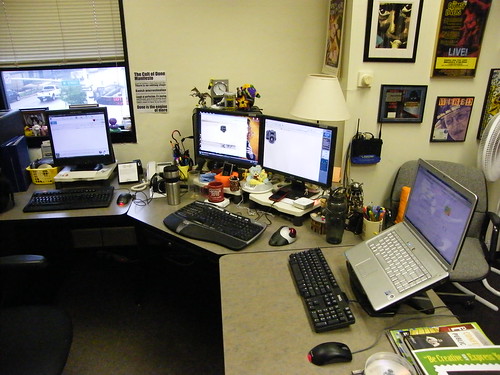 This doesn’t look like my desk but I’m hoping to get 4 screens if possible 🙂
This doesn’t look like my desk but I’m hoping to get 4 screens if possible 🙂
Source: https://flic.kr/p/818pwN
ERS? It’s Electronic Resources Specialist. In some places, it’s also known as Electronic Resources Librarian etc. My work deals mostly with electronic resources: electronic books, electronic journals, images and so forth. I manage the life cycle from start to end; ensuring that trial, acquisition, access, troubleshooting and maintenance and renewal stages are completed. I have a team of 4 (including myself). It’s a thankless job at times; no thank you-s until someone cannot get access / download an article or chapter.
I’m not going to ramble on the competencies listed by several organizations such as NASIG (North American Serials Interest Group), UKSG (United Kingdom Serials Group) and the like. Those are the intrinsic criterion needed. I’ll list them down later in this blog post. What I’m touching on are more on the ‘soft’ side of it. For me, there are a few. They are:
- Patience
- Perseverance
- Resilience
Quick check in Oxford Dictionary:
- Patience: “the ability to accept delay, trouble or suffering without becoming angry or upset”
- Perseverance: “continue doing something in spite of difficulty or lack of success”
- Resilience: “able to withstand or recover quickly from difficult conditions”
In our work life, we have, in one way or another, face with testing situations. In my case, it revolves around people or technology. The technology part: that’s not that too difficult. Find the relevant manual, read it and you can get the answers. Otherwise , you can contact the vendor techies and they are willing to check it out on your behalf. Googling for answers would also be an alternative.
However, when dealing with humans, that can be tricky. For example, not many would admit that they are wrong even when presented with facts. The worst part is the “blame game”. I believe that we can learn a lot when we readily admit our mistakes. Learn from it and move on. Humans are never perfect.

Source: https://flic.kr/p/7Fjpn
Coming back to the 3 traits, let me touch on the first one: Patience: Leading requires patience. Mistakes happen; sometimes accidental; sometimes due to lack of knowledge. Addressing those mistakes are important. That’s where learning comes in: for both parties. It provides a chance to address our shortcomings. An opportunity for someone to learn new skills; an opportunity for someone to understand personality differences and how to navigate around it. Win win scenario; hopefully.
The way we address these issues are also important. Whether its one on one sessions or during team meetings, it will affect whether our message will get across. Sometimes one to one meetings would work better than others. In the context that I am in, I believe that having one to one ‘chats’ usually works. Nobody likes to be mocked in public.
I do tolerate mistakes but if the same mistakes keep happening more than 2 times; that will set off alarm bells in my head 🙂 Either its a case of being incompetent or just insubordination. Dealing with such cases require more tactfulness.
Perseverance. When the going gets tough, keep on moving, keep on striving. For example, I encounter issues such as electronic resources sudden access disruption. Now, the business work week in Saudi Arabia starts on Sunday till Thursday. Imagine on a late Thursday afternoon, electronic publisher X (located in the States with business week starting from Mon – Fri) decided to pull the access plug for a particular product title ABC. Reason: Detected excessive downloading activity.
I’ll be scrambling to get publisher X attention to inform them that we are on top of things and identifying the potential root cause. Next, I have to make sure that our access is re-activated. If I’m lucky, access is restored by Friday evening. Otherwise I would have to work during Friday (which is a weekend) by the way, to get it up. If I miss it, then access would be affected till Monday afternoon when the publisher office starts work. (due to geographic time differences). Note that our work week starts on Sunday over here.
To complicate things, we may have researchers who are in need of access and who aren’t able to do so. They may not know and do not want to know the reason why access is denied. What they want to know, when can they get access to the desired information. In these instances, people management skills come in handy 😉
Resilience. Before taking my present job, I was previously a Reference/Subject Librarian and a Library webmaster. Though electronic resources was not something new for me, I was faced with a steep learning curve. I had to learn most of my stuff fast. Sometimes you learn on the job. On other occasion, you will rely on your intuitive and experience to get the task completed. I had my ‘wins’ and my ‘losses’. I faced setbacks. Those setbacks provided a platform for me to learn and a reminder that my learning journey is never ending.
I had no mentor over here. They expect me to hit the ground running. Hence the expat terms 🙂 However, the support I got back then (and now) is enormous. I’m grateful for that. My superiors were ever willing to allow me to go for overseas conferences and trainings to complement my knowledge.
The adventure continues ….
Oh by the way, here’s the core competencies for Electronic Resources Librarian from NASIG.